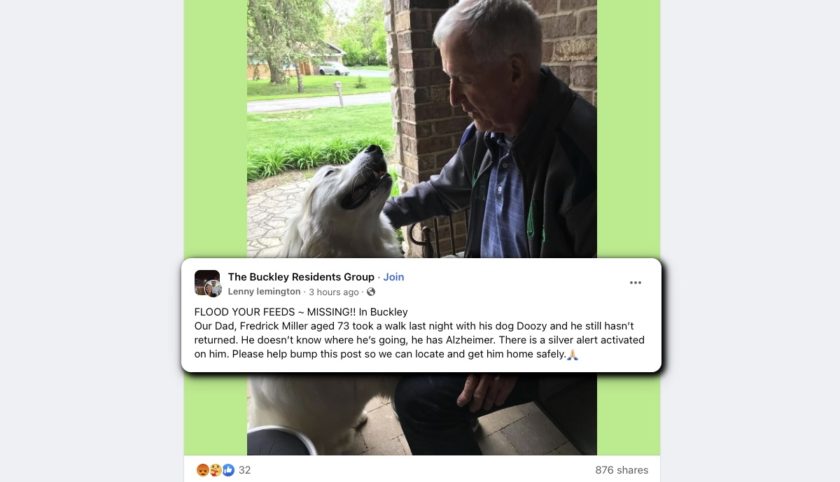Buckley pensioner with dementia missing? Viral Facebook post about man and his dog is a hoax

A viral Facebook post circulating in Flintshire, claiming that a 73-year-old Buckley pensioner with dementia named Fredrick Miller has gone missing with his dog Doozy, is a hoax.
The post says: “FLOOD YOUR FEEDS ~ MISSING!! In Buckley.”
Our Dad, Fredrick Miller aged 73 took a walk last night with his dog Doozy and he still hasn’t
returned. He doesn’t know where he’s going, he has Alzheimer. There is a silver alert activated
on him. Please help bump this post so we can locate and get him home safely.”
The post has appeared in several Flintshire Facebook groups and selling pages and has been shared over 860 times.
Comments on the Facebook post have been disabled, which is often a sign a missing person appeal may not be genuine, according to Derbyshire police.
An identical post has surfaced in Australia, targeting the community of Warnbro. This post also featured a man named Fredrick Miller, aged 73, missing with his identically named dog, Doozy. The identical photograph is used in both posts.

Frederick also appears to have gone missing in Stoke Gifford, South Gloucestershire.

According to Fact-checking website Full Fact, these types of posts are likely to have come from the US because they refer to a “silver alert”, which is a type of alert specific to the US that notifies the public about missing vulnerable people, for example those who are elderly or have dementia and other conditions.
Full Fact has written about Facebook posts with similar false claims many times. This includes hoaxes about missing children, abandoned babies and injured pets.
Online security experts, Malwarebytes, have termed these deceptive posts as ‘content switcheroo scams.’
Full Fact says: “We’ve often seen posts like this being changed after reaching a large audience, so that they advertise surveys or housing websites instead.”
Such tactics are manipulative, playing on human emotions to gain traction or possibly for more malicious intents.
For users wishing to avoid falling prey to such scams, Malwarebytes offers several pieces of advice:
- Be wary of posts with disabled replies.
- Conduct reverse image searches on photographs to check for authenticity.
- Search for the text of suspicious posts across different social media platforms to check for duplication.
- Scrutinise account details, especially for newly created accounts or those with altered names.
The surge of such deceptive narratives on social media platforms underscores the need for users to remain vigilant, always verify the authenticity of posts, and report any suspicious activity.
Spotted something? Got a story? Email: [email protected]
Latest News
